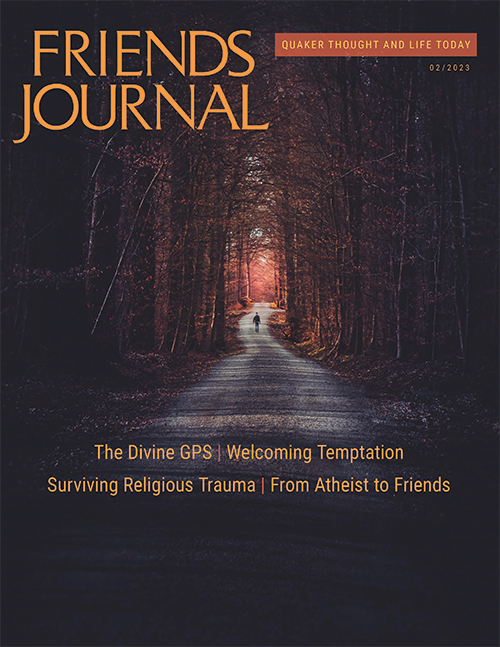A Test of Faith
The prayer that Jesus taught the crowds in Matthew 6:9–13 and his disciples in Luke 11:2–4—the one referred to as the “Our Father” prayer when I learned it as a child—contains the phrase “lead us not into temptation” in the King James Version. This has always struck me as a strange phrase, implying that without such a prayer God would lead us into temptation. Why would God do that? Everyone knows that temptations are things to be avoided: invitations to do something wrong or forbidden. Or are they?
A clue to the answer to this question seems to me to lie in the story of Jesus’s temptation in the wilderness after his baptism by John. This incident was obviously important since it is included in each of the three synoptic Gospels—Matthew, Mark, and Luke—in almost the same mystical terms: the Spirit descends like a dove and the voice of God is heard.
I often wonder how the gospel writers knew some of the stories they wrote down. In the case of Jesus’s baptism and subsequent experience, no one would have known about them except Jesus himself. For the gospel writers to have known the story, Jesus would have had to tell it to someone, then that person tell it to another, and so forth until it was finally written down and then copied or rewritten and embellished by the gospel writer decades later.
Although we cannot know how Jesus might have described these experiences himself, it is possible to tell the story of his temptation in a non-mystical way that is consistent with the intent of the gospel versions and that makes the story relevant to each of us. This may suggest an understanding of the meaning and purpose of temptation that differs from the usual one.
My version goes like this: As far as his community is concerned, Jesus has led an exemplary life. He has looked after his mother and his brothers and sisters, helped others in Nazareth, and followed all the Jewish spiritual and social practices. Nonetheless, he feels something is missing: he feels called to be doing something different with his life, but he’s not certain what that is. He is impressed by what he hears about John’s preaching and goes to be baptized with the hope that the experience will help him know what to do. He is 30 years old; his brothers and sisters are old enough to take care of themselves and their mother; he is dissatisfied with his life and ready to change.
In that frame of mind, he comes to the Jordan River and is baptized: submerged fully in the cool water at the hands of John. When he emerges from under the water, he feels energized in a way he has never felt before. It is both an emotionally and spiritually inspiring experience: equivalent to feeling that he has been born anew, as he will later say, with a stronger awareness of God’s presence in his life. Although he may not know why he feels this way, the feeling is so intense that he cannot simply turn around and go home, nor can he stay around and hang out with the crowd. In Mark’s Gospel, it says that the Spirit “driveth” him into the wilderness (Mark 1:12 KJV), while others say “led” or “guided.” I prefer the word “driveth” because it implies that the impetus to flee the crowd and be alone was so strong that he could not resist.
We should not fear temptations but rather welcome them as opportunities to demonstrate our consistent commitment to following a spiritual path and letting God lead our lives.
None of this seems unusual to me. Many people have had strong conversion experiences in which the presence of God is felt suddenly and more intensely than before. And often this is accompanied by a feeling of needing to be alone to assimilate the experience. On a more modest scale, I have had similar feelings after unexpectedly delivering a personally moving message in Quaker meeting for worship. Elsewhere I have written that the experience is like that of a tree shaking in the aftermath of a hurricane, so overwhelming is the feeling of being used or inspired by God. Afterward, I do not want to talk to anyone; I want to quickly leave and be alone.
Since it is the “Spirit” that drives him into the wilderness, it must be the same Spirit that at his baptism had descended on him like a dove: the Spirit of God. If that is the case, it would seem reasonable to assume that the Spirit did this to continue to nurture him and help him understand the meaning of his experience. But that is not what appears to have happened. Instead, he is tempted, and since it is said that he is tempted by Satan, the implication is that he is being lured to do something wrong. It isn’t necessary to believe in Satan to understand what the temptations might have been. Having experienced a surge of energy and a calling much stronger than anything he’s previously experienced, Jesus naturally would wonder what he should do in response. Does it mean he should become a leader of the Jewish people’s effort to overthrow the oppression of the Romans? Does it mean he should use his abilities in a way that will bring prosperity to himself and his family? Should he seek material success, prestige, and leadership in the world? To each of the three temptations he is offered, he says no, but there is nothing to which he says yes.
There is, however, another way of looking at this experience. If it is the Spirit of God that leads him into the wilderness, we must assume that whatever happens to him there is positive: something that will help him understand his baptismal experience and find his way forward, for God is good and brings only good things into our lives. So, although the word “temptation” normally has a negative connotation, in this instance, it has a different meaning.
My Oxford American Dictionary gives “to make a trial of” or “to try the resources of” as alternative definitions of tempt or temptation. To put it simply, it means “to be tested.” In fact, this is the sense of the story given by David Bentley Hart’s recent translation of the gospels that tries to be faithful to the original Greek. He translates the phrase in the Lord’s prayer as “not bring us to trial.” From this perspective, the temptations aren’t negative at all, and they do not come from Satan. They come from God and are tests to determine if Jesus is ready to commit himself to a spiritual path by testing whether he is strong enough to say no to other directions for his life. They provide an opportunity for Jesus to make conscious decisions about the way he wants to live his life and the type of person he wants to be. They are a test of his integrity—his commitment to follow his spiritual values—and of his faith that God, and not he, is guiding his life.
One of the important lessons of the story is the understanding that it is often necessary to say no to some opportunities in order to find the one that is most conducive to the progress of our spiritual journey. Sometimes it is necessary to close the door on one set of interests or activities to give God the opportunity to open the door to another. Although Jesus leaves the wilderness with no clarity about what he should do, saying no to the temptations was an essential step in his spiritual journey: one that closed off certain options and prepared him to be ready to say yes when the appropriate direction presented itself.
He returns to Nazareth; in some versions, it says he learns that John has been imprisoned and his preaching silenced. This itself must pose a question for Jesus: should he take over in John’s place?

Panorama of the Galilee region in northern Israel and southern Lebanon. Photo by javax_ber avatar.
In another version, he goes to the synagogue to pray for guidance and is given the scroll of Isaiah to read:
When he had opened the book, he found the place where it was written, The Spirit of the Lord is upon me, because he hath anointed me to preach the gospel to the poor (Luke 4:17–18 KJV).
The words find him, he does not select them. It is the voice of God speaking directly to him. In that moment, he realizes what he is meant to do, what he is to say yes to. When he says to those assembled, “This day is this scripture fulfilled in your ears” (Luke 4:21 KJV), he is saying it to himself for the first time: today, right now, I know what God is calling me to do, and I am ready.
Temptations come in many different forms. Some seem so minor and insignificant that indulging in them doesn’t seem to do any harm. Some even appear to be good in themselves. But each one, no matter how insignificant it may seem, is a test of our integrity—our ability to make conscious decisions about how and by what standards we want to live our lives—and a test of our faith in God’s goodness and that it is God that is guiding our lives.
There have been many times in my life when I was tempted to pursue a certain direction, and the ability to say no enabled me to be open to an unexpected and more appropriate opportunity. At one point in my career, I was being considered for the position of dean in the architecture school where I was teaching in Austin, Texas. It was a position I thought I wanted and eagerly sought. During that time, I came to a convention in Philadelphia, Pennsylvania, where I happened “by chance” to bump into the dean of the University of Pennsylvania’s architecture school. He said he knew of my situation and advised me not to take the position and get bogged down in academic administration. For me, his words were equivalent to the words of Isaiah for Jesus: I knew immediately that he was right. I knew it was my ego that had wanted the position for the recognition, and it was not something consistent with my real interests. Upon returning to Austin, I withdrew my name from consideration. Shortly thereafter, I was approached by a representative of the mayor of Philadelphia who asked me if I would take the position of director of the city’s housing and community development programs: a job much more consistent with my interests and values, and one that I would not have been able to say yes to if I had not said no to the other. Closing one door had given God the opportunity to open another.
Jesus did not fear the temptations he faced in the wilderness; indeed, I imagine that he welcomed them, knowing they were merely a test of his integrity and faith: an essential step in the process of finding the path God was calling him to follow. So too we should not fear temptations but rather welcome them as opportunities to demonstrate our consistent commitment to following a spiritual path and letting God lead our lives. Then, perhaps, we might offer the following prayer in lieu of the phrase Matthew and Luke suggest:
Our Father, Divine Intelligent Energy of the Universe, give us the strength to resist the paths that would lead us astray, and help us to recognize the ones most conducive to progress on our spiritual journey.





Thank you for this great article by John Andrew Gallery. It really speaks. Let us please have more of his writings in the Journal. Thank you. Kind regards from Perth, West Australia.
We’d better not dismiss Jesus’ clear recommendation: to pray that God not expose us to temptation. A legend about temptations Jesus may well have faced earlier is no justification for welcoming them ourselves. Yes, Satan in the Hebrew scriptures serves as God’s agent for painfully testing human loyalty; and in Walter Wink’s description of Satan’s role in the Christian gospels, Satan’s testing appears sometimes necessary: i.e. to undermine Peter’s naive confidence (before the Crucifixion) that “I am ready to go with you to prison and to death.”
Whether we attribute temptations to Satan, to ourselves, or to God (as ultimate cause of whatever happens), they clearly help God make us aware of our inadequacies — sometimes with considerable harm to ourselves and others, leaving us with kinds of knowledge we might far rather not have learned: i.e. ‘what happens if I push this?’ ‘what does that fruit really taste like?’, ‘what could go wrong?’
We are far better off when God can bring insight by gentler means, as implied by the prayer’s request not to subject us to such testing.